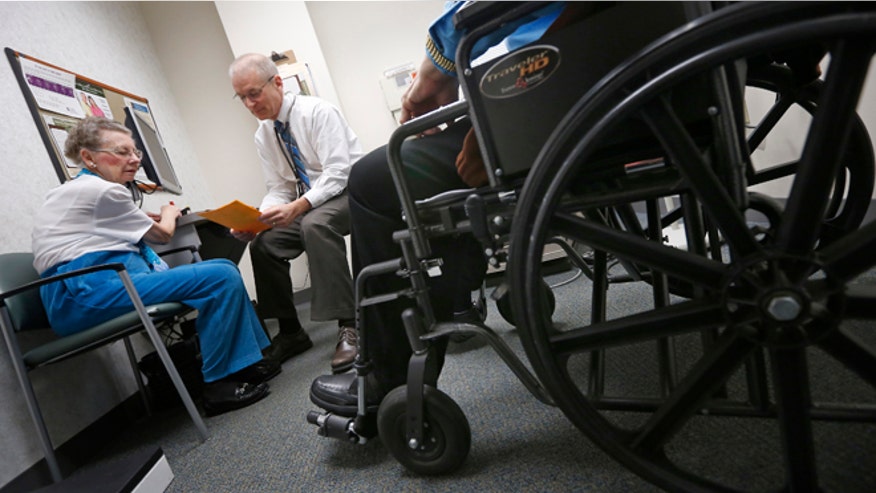Here we go… down the road to single-payer… socialized medicine… the plan all along~

Nov. 26, 2013: A doctor speaks to patients at his office in Peoria, Ill.Reuters
Fox: WASHINGTON – While all eyes are on the ObamaCare rollout, an ambitious health care experiment is going forward in Vermont that would create a government-run alternative know as a "single-payer" system -- and it's starting to attract more attention from liberals frustrated with the Affordable Care Act's implementation.
Democrats' faith in ObamaCare has been shaken by the technical failures of the federal and state insurance exchanges as well as, in some cases, premium increases. In Vermont, however, they see a potential first step toward the kind of national government-run health care system some have advocated for years. Filmmaker Michael Moore, in a column last week blasting ObamaCare, said Vermont's plan could "change everything."
But critics say the proposal goes too far and would kill thousands of jobs. "It’s not practical,” Vermont state Rep. Patti Komline, who voted against the plan, told FoxNews.com. “There are too many complications involved.”
A single-payer plan would largely sideline the insurance industry, and instead set up a government-managed insurance system to collect all health care fees and pay out all health care costs.
Full implementation of Vermont’s single-payer plan could be held up for another three years, at least. In order for Green Mountain Care to fully launch in 2017, the health care exchange would have to get approval from the federal government to use federal money to fund the state program.
State law would also require Vermont to define the benefits of the single-payer program and provide a three-year budget that clocks in less than current health care costs.
University of Virginia public policy professor Raymond Scheppach said it will take another half decade to determine whether Vermont’s controversial plan even works and if there are any real benefits associated with it. He also says that regardless of outcome, Vermont’s political makeup differs from other states and therefore would not provide an accurate view of what’s to come.
The single-payer debate recently resurfaced in national headlines following the Dec. 31 op-ed piece in the New York Times by Moore. In it, Moore called ObamaCare “awful” and said liberals have avoided speaking in public about the problems with it because they didn’t want to provide the president’s critics with additional ammunition.
Moore went on to sing the merits of a single-payer system and said that the real problem with ObamaCare is that it is a “pro-insurance-industry plan implemented by a president who knew in his heart that a single-payer, Medicare-for-all model was the true way to go.”
Supporters say the single-payer system would cut down on the administrative waste and complications associated with having multiple billers and billing systems. Opponents say such a widespread overhaul would be bad for business.
Vermont became the first state in the country to lay the groundwork for single-payer health care. Gov. Peter Shumlin, a Democrat, signed the plan into law in May 2011.
The initiative, which was approved by the Democratic-controlled House and Senate, promises to extend coverage to all of Vermont’s 620,000 residents, of which around 47,000 residents are uninsured and 150,000 are underinsured.
"This law recognizes an economic and fiscal imperative," Shumlin said during a press conference when he signed the bill. "We must control the growth in health care costs that are putting families at economic risk and making it harder for small employers to do business.”
The exchange, Green Mountain Care, will set reimbursement rates for health care providers and streamline administration into a single, unified system.
Some experts say a revised system would save an estimated $580 million annually, and $1.9 billion by 2019. But the single-payer system’s creator, Harvard economist William Hsiao, says it could generate even greater profits for Vermont.
Hsiao predicts his plan would save the state 25.3 percent a year in total health care spending, lower household and employer health care spending, boost job growth and create a higher economic output for the state.
The savings, he said in a 2011 Health Affairs article, would come from tort reform for malpractice suits, better governance and lower administrative expenses. Vermont would rack up $4.6 billion in savings during the first five years of the program which he says would be used in part to cover the state’s uninsured as well as to expand benefits and services.
Vermont’s health care spending runs about $5 billion annually, with costs rising between 6.5 percent and 8.5 percent in recent years.
But not everyone is on board with the plan. It is still unknown how Vermont will pay for the plan and whether that money will come from additional taxes on its residents.
Komline says despite the plan's passage, she doesn’t see Vermont residents warming up to the idea of a single-payer system any time soon. She also said that Vermont, because of its small size and political makeup, is open to influence from special interest groups.
“It doesn’t take much money for special interest groups to come in and influence votes,” she said. “That’s why Vermont was among the first to legalize pot and same-sex marriages.”
Calls to the governor's office for comment were not returned.
No comments:
Post a Comment